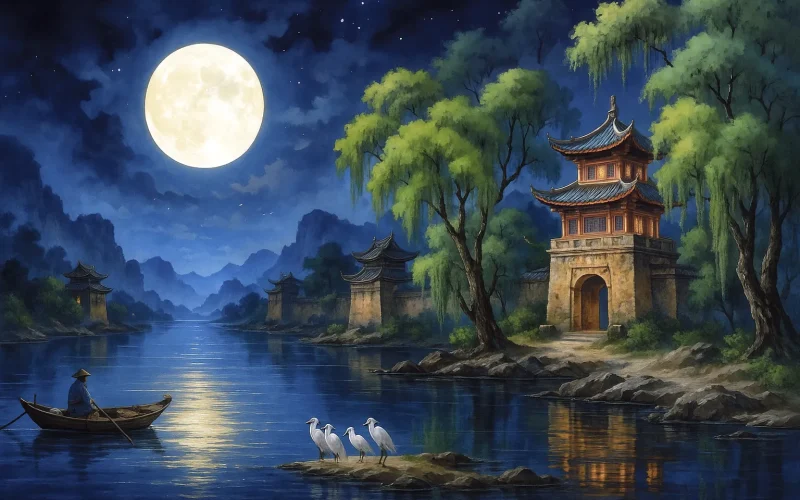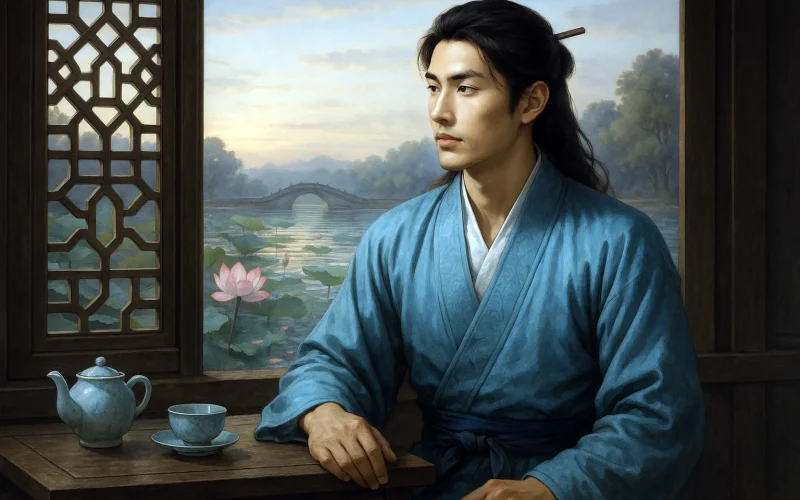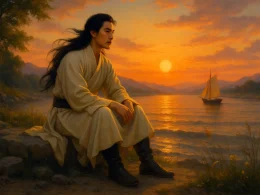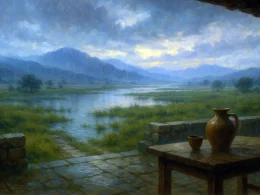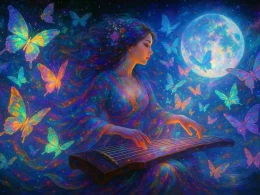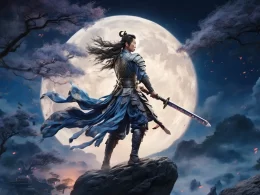Night-dark clouds circle the mast's silhouette,
The river cradles star-reflections—herons sleep on sand.
A traveler gazes wistfully at willows by the Su Terrace—
Once, they swept fallen blossoms for the King of Wu.
Original Poem
「姑苏怀古」
姜夔
夜暗归云绕柁牙,江涵星影鹭眠沙。
行人怅望苏台柳,曾与吴王扫落花。
Interpretation
Composed during Jiang Kui's travels in the Southland, this poem captures the poet's contemplation of Wu's historic sites under the Southern Song Dynasty's precarious reign. With the nation clinging to the lower Yangtze region, its former glory diminished, Jiang Kui—witnessing the desolation of Wu's landscapes and the silence of its relics—pours forth profound historical melancholy and personal sorrow. Using Suzhou as his elegiac focal point, he contrasts the vanished splendor of King Fuchai's Gusu Terrace with the empty riverbanks and hushed night before him, merging collective memory with intimate grief.
First Couplet: "夜暗归云绕柁牙,江涵星影鹭眠沙。"
Yè àn guī yún rào tuó yá, jiāng hán xīng yǐng lù mián shā.
Night dims—homebound clouds coil round the mast;
Stars drown in the river where egrets sleep fast.
This couplet paints a still, profound riverscape. "Homebound clouds" (归云), "drowning stars" (星影), and "sleeping egrets" (鹭眠) interweave motion and stillness, crafting an ethereal Jiangnan night. The sparse yet resonant imagery sets a meditative stage for the historical lament to follow—its quiet expansiveness belying deep currents of thought.
Second Couplet: "行人怅望苏台柳,曾与吴王扫落花。"
Xíng rén chàng wàng Sū tái liǔ, céng yǔ Wú wáng sǎo luò huā.
A traveler gazes wistfully at Gusu's willows—
Once they swept fallen blooms for the King of Wu's pillows.
Here, the scene pivots to memory. The "willows of Gusu Terrace" (苏台柳), now mere spectators to time's passage, once participated in King Fuchai's lavish spring rituals with his consort Xi Shi. This juxtaposition of enduring nature and evaporated human grandeur sharpens the poem's elegiac edge. By projecting his melancholy onto the willows—silent witnesses to history's cycles—Jiang Kui achieves a restrained yet piercing sorrow, where every rustling leaf whispers of transience.
Holistic Appreciation
In just twenty characters, this poem captures the profound tension between Jiangnan's nightscape and the echoes of history. The opening lines depict the serene beauty of the river at night, where mountains and waters remain unchanged, enveloped in silence—a testament to the eternal passage of time. The latter lines evoke nostalgia for the bygone days of Gusu Terrace, stirring poignant emotions. The willow, personified, becomes not merely a witness to history but also a vessel for the poet's own memories. The line "once swept fallen petals for the King of Wu" is especially striking—where once there was romance and grandeur, only the trees remain, deepening the melancholy of the present.
Though ostensibly a poem of historical reflection, it transcends mere lamentation of the past, offering instead a sober contemplation of reality and the wistfulness of human existence. It is both tender and profound. Compared to Li Bai's "Gazing at Antiquity on Su Terrace," which directly contrasts prosperity and decline, Jiang Kui's approach is more ethereal and restrained, his emotions subtly contained—yet it reveals even greater depth of feeling and poetic vision.
Artistic Merits
- Elegant Imagery, Ethereal Brushwork: Images like "returning clouds," "starlit reflections," "sleeping egrets," and "Su Terrace willows" are delicate yet laden with meaning, creating a serene and picturesque atmosphere.
- Seamless Structure, Emotion Woven into Scenery: The first couplet sets the scene, grounding the poem in nature; the second introduces emotion through objects, achieving a natural and fluid transition.
- History as Allegory, Subtle and Profound: While ostensibly about willows, the poem is truly about people—using the past to reflect on the present, meditating on the rise and fall of dynasties and the fate of individuals.
- Concise Language, Rich Connotation: Despite its brevity, the poem carries immense weight, embodying Jiang Kui's signature style—"graceful in rhythm" and "profound in its simplicity."
Insights
This poem reminds us that though history may be distant, its emotions and lessons still resonate today. The enduring mountains and rivers, the unchanging trees—they bear witness to the impermanence and vicissitudes of human life, while the poet, with a sensitive heart, discerns the deeper meaning of time. Poetry is not merely a depiction of beauty but a response to history and existence. Through this compact lyric, Jiang Kui shows us that true literature does not lie in loud proclamations but in finding vast meaning in the smallest details and profound emotion within quiet scenes.
About the poet
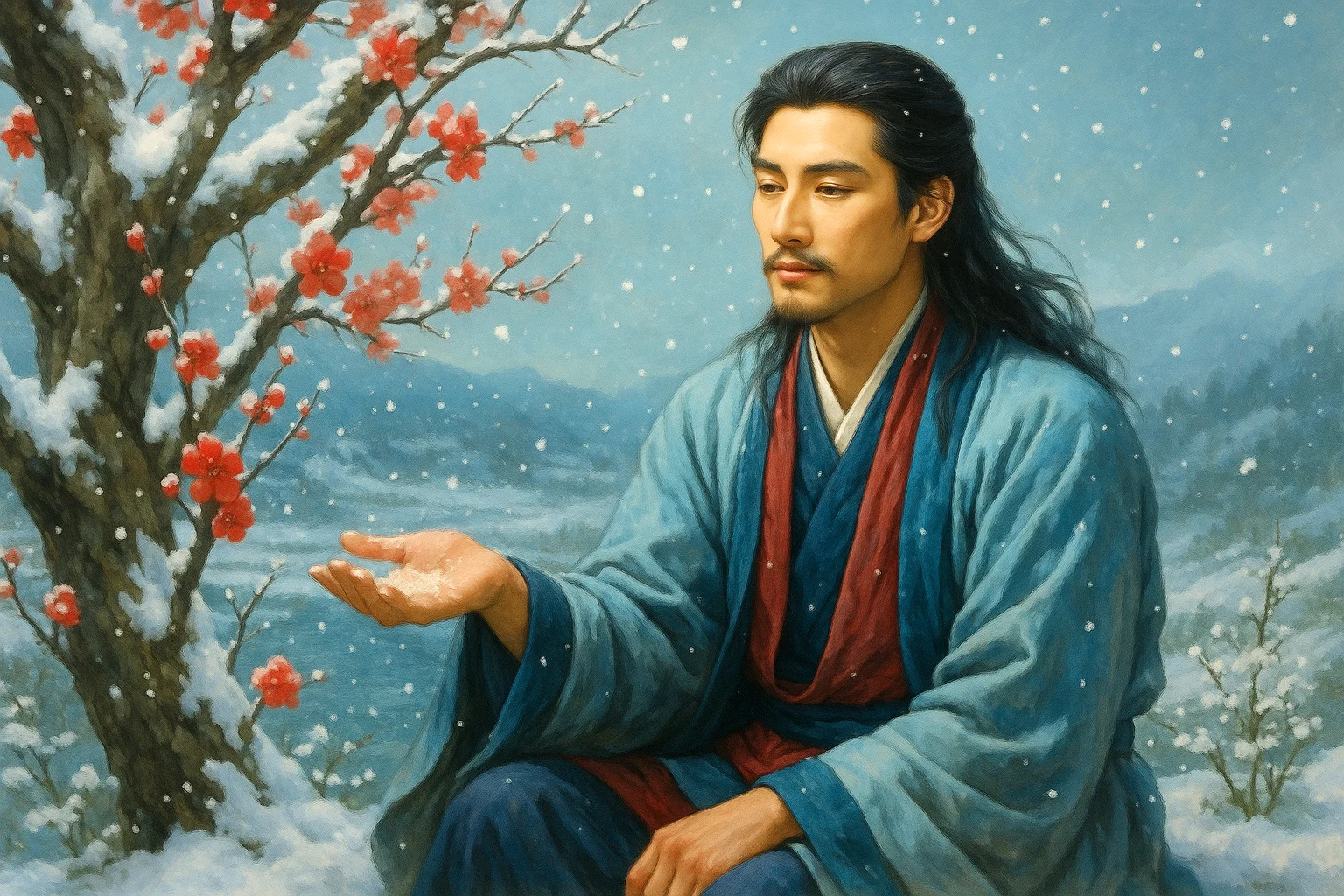
Jiang Kui (姜夔, c. 1155 - 1221), a native of Poyang, Jiangxi, was a Southern Song Dynasty lyric poet and musician. He remained a commoner throughout his life. His lyrics are known for their ethereal and austere style, and his poetry is also highly regarded. Along with Fan Chengda and Yang Wanli, he is celebrated as one of the "Four Great Masters of the Restoration."






